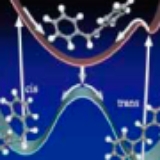Chemical reactions are leveraged to create various substances, including organic/inorganic materials and pharmaceuticals, and also support the foundation of healthy, comfortable lifestyles for people. Recent studies have revealed that the most delicate life phenomena also stem from various combinations of chemical reactions. In future work, there is an urgent need to design highly efficient/selective chemical reactions and elucidate/analyze the principles behind them. Also indispensable is research on chemical process engineering geared toward the expansion of reactions to an industrial scale. Furthermore, the development of reactions to address environmental/energy issues and the invention of energy conversion systems using new catalysts will also play a major part in shaping the future of mankind.
The Molecular Chemistry and Engineering Course provides a wide range of systematic programs covering the underlying principles of chemical reactions, reaction design in disciplines such as organic chemistry and catalytic chemistry, elucidation of reaction mechanisms and process control. The course is designed for graduate students who have taken other courses not only in chemistry but also in a wide range of fundamental natural sciences, such as physics and biology. It also incorporates programs concerning material design and synthetic technology development in response to environmental problems and energy issues matters that require urgent attention in today’s society.
The course is taught by a diverse lineup of instructors in molecular chemistry. Students systematically learn in a series of areas from laboratory level to production-systems level through subject groups covering the basics (such as physical chemistry and organic chemistry) and also incorporating catalytic chemistry and reaction engineering. It aims to turn students into engineers and researchers capable of contributing to the design of organic materials/substances, functionality enhancement, production technologies and the resolution of environmental/energy issues.
More specifically, the Molecular Chemistry and Engineering Course offers educational and research programs based on the four research groups outlined below.
Microscopic Chemical Analyses Unit
To ensure the efficient synthesis of physiologically active substances (e.g., pharmaceuticals), organic functional materials and other substances, it is necessary to develop reactions characterized by almost-100-percent yields and high selectivity. To this end, reagents and catalysts must be designed based on sound principles, and optimum reaction conditions must be set. Additionally, synthesizing compounds with complex structures requires the development of rational synthetic routes. This research group provides a wide range of comprehensive educational and research programs based on considerations related to organic chemistry, including efficient molecular transformation reactions using organometallic reagents and catalysts, asymmetric synthesis reactions, environmentally benign synthetic reactions and efficient synthesis of naturally occurring organic compounds.

Fine Chemical Reactions Unit
To ensure the efficient synthesis of physiologically active substances (e.g., pharmaceuticals), organic functional materials and other substances, it is necessary to develop reactions characterized by almost-100-percent yields and high selectivity. To this end, reagents and catalysts must be designed based on sound principles, and optimum reaction conditions must be set. Additionally, synthesizing compounds with complex structures requires the development of rational synthetic routes. This research group provides a wide range of comprehensive educational and research programs based on considerations related to organic chemistry, including efficient molecular transformation reactions using organometallic reagents and catalysts, asymmetric synthesis reactions, environmentally benign synthetic reactions and efficient synthesis of naturally occurring organic compounds.

Catalytic Reactions Unit
The ability of catalysts to increase the rate of chemical reactions has enabled an efficient supply of substances and materials that are useful in society. Recently, catalysts have also come to play important roles in the fields of energy and the environment, such as their use in fuel cells and in the purification of automobile exhaust gas. As a result, the development of catalysts with improved functionality and higher efficiency is desired. This research group provides systematic educational and research programs covering areas ranging from the basics to application, including the design of metallic oxides, metallic nanoclusters and other catalysts, the elucidation of action mechanisms, the analysis of catalytic reactions and the development of new functional catalysts. Our programs also expand to involve groups researching matters related to energy and the environment, including the development of bio-energy sources.

Chemical Process Engineering Unit
To utilize functional materials for the enrichment of our daily lives, it is necessary to develop systems which can safely produce such materials at the required quality level. Such systems cannot be established without the development of rational chemical processes which are not only highly efficient but which are also compatible with the environment This research group offers systematic educational and research programs based on chemical engineering, which teaches how to develop and design such novel chemical processes. Programs aimed to establish methods to upgrade and effectively use carbon resources, such as heavy oil and coal, and to establish a sustainable energy system based on renewable biomass resources are also provided.

